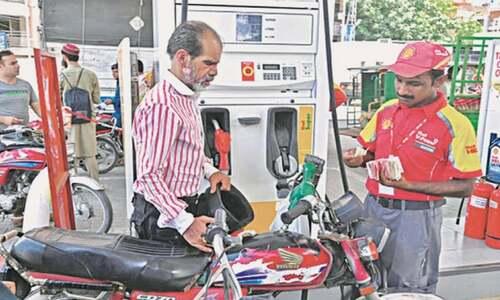ISLAMABAD: The electricity rates for consumers of 10 distribution companies (Discos) of ex-Wapda are set to go up by 66-paisa per unit under monthly fuel cost adjustments (FCAs) and another 91-paisa per unit under quarterly tariff adjustments (QTAs).
The National Electric Power Regulatory Authority (Nepra) has called two separate public hearings on March 30 to take up two separate petitions for tariff increases.
The first petition filed by Central Power Purchasing Agency (CPPA) on behalf of all Discos seeks about 66-paisa per unit increase on account of higher generation cost electricity consumed in February to generate about Rs4.7 billion in additional cash flows to power companies. The higher electricity rates, on approval by the regulator, would be recovered from consumers in the upcoming billing month of April.
Separately, all the Discos have filed separate petitions for QTA for the period July 2020 to December 2020 (two quarters) with additional cumulative financial impact of Rs91bn that works out to be about 91-paisa per unit increase in base tariff. The tariff adjustments under QTAs would become part of the tariff separately under a schedule to be set jointly by the regulator and the government.
The CPPA in its petition said Discos had charged consumers a reference fuel tariff of Rs4.14 per unit in February but the actual fuel cost turned out to be Rs4.80 per unit, hence it should be allowed to charge 66 paisa per unit additional cost to consumer.
Total energy generation from all sources in February was recorded at 7,281 gigawatt-hour (GWh) at a total fuel cost of Rs44bn at the rate of Rs4.7 per unit. After accounting for 3.9pc transmission losses, about 6,996 GWh energy was delivered to Discos at Rs33.5bn at the rate of Rs4.8 per unit.
The data showed that hydropower generation improved to 28pc of overall energy mix compared to 13pc in January when canals mostly remained close for annual maintenance.
As a result, the share of coal generation dropped slightly to 26pc in February compared to about 32pc in January.
On the other hand, the generation from furnace oil based plants dropped to just 1pc in February from 12pc a month earlier. There was absolutely no power intake from power plants based on high-speed diesel and solar.
The RLNG-based power generation to national grid increased to 17.5pc in February from 11.3pc in January. The generation from local gas stood at 12.45pc in February.
On the other hand, the share of nuclear power also slightly increased to about 10.9pc. The share of wind power and bagasse stood at 1.35pc and 1.36pc respectively..
There was no fuel cost on hydroelectricity while coal-based fuel cost stood at Rs7.06 per unit in February. Nuclear energy fuel cost stood at slightly over Rs1.01 per unit while power produced local gas stood at Rs7.7 per unit. The cost of RLNG-based plants was worked out at Rs8.82 per unit.
The electricity imported from Iran had a cost of Rs9.7 per unit and its total share in power supply was just 0.41pc. The most expensive generation came from at Rs11.9 per unit from furnace oil based plants.
Published in Dawn, March 20th, 2021













































